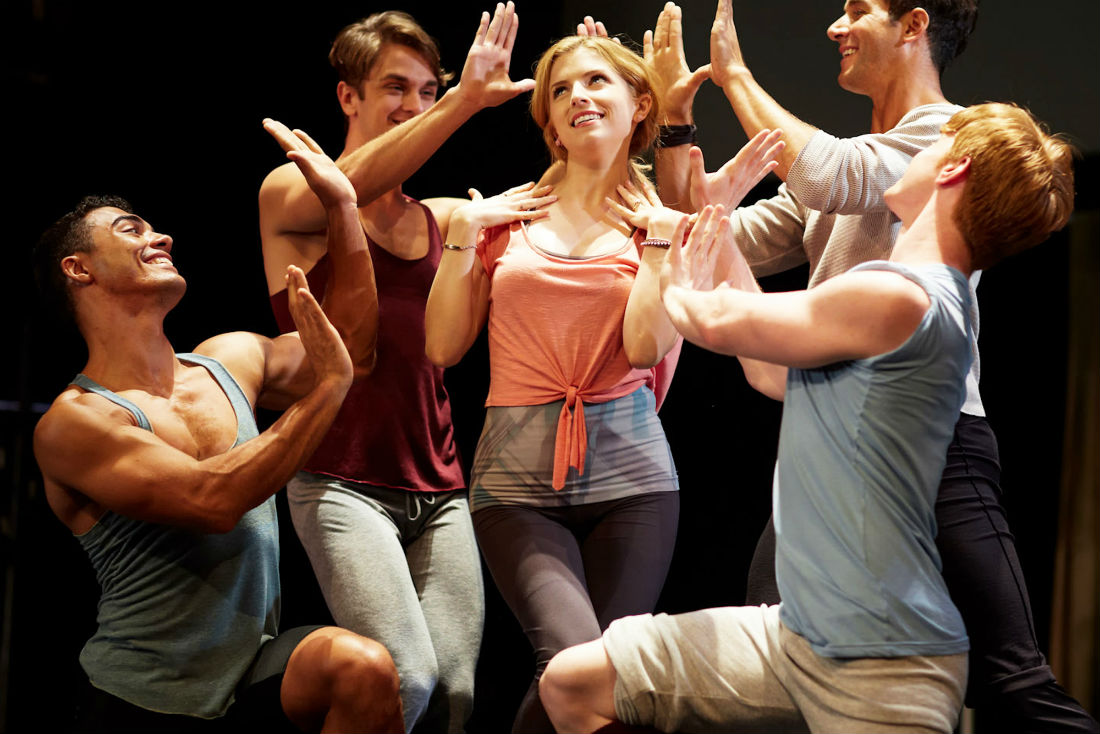With Jason Robert Brown in town for the TCU Festival of American Song, I feel like now’s as good a time as any to review The Last Five Years, a movie based on Brown’s stage musical, even if the film has been out on disc for a few weeks now. It tells the story of the marriage and breakup of Jamie Wellerstein (Jeremy Jordan), a Jewish New York City novelist who becomes a literary star at the age of 23, and Cathy Hiatt (Anna Kendrick), an actress whose career never takes off. Like the theatrical play, the film alternates between their points of view, only Jamie’s story is told in chronological order, while Cathy’s is told in reverse. The story is based heavily on Brown’s first marriage, so much so that his ex-wife sued him and forced changes to an initial draft of the story. Brown has an uncredited cameo in the film as an audition pianist.
You know Kendrick, whose presence is presumably the reason why this film got made. You might not know Jordan. The 30-year-old stage veteran is a Tony and Grammy nominee for his work starring in the Broadway production of Newsies, and he had a recurring role in Season 2 of TV’s Smash. He doesn’t have the screen experience or presence that his co-star has, but he does acquit himself well by a one-sided phone conversation in which he finds out that Random House wants to publish his book. As for his co-star, this is a harder-edged Kendrick than you’re used to seeing, as she portrays someone whose professional frustrations are eating away at her, and quite well.
The trouble is that this musical might well be unfilmable. On stage, this two-character piece leaves us to infer the presence of other people in the story like the woman Jamie cheats on Cathy with, or the inattentive auditioners at Cathy’s auditions. Having only two actors onscreen the whole time is a hurdle that would make many filmmakers quail, and that’s what it does to Richard LaGravenese, the veteran screenwriter of The Fisher King and TV’s Behind the Candelabra whose track record in the director’s chair has been mostly undistinguished since his 1998 debut Living Out Loud. (Side note: That underappreciated comedy contains what is still Holly Hunter’s greatest performance ever.) He’s essentially forced to fill in the scenery with a lot of actors surrounding Jamie and Cathy who sit there mutely or recite a few stray lines of dialogue.
It works against the mostly realistic approach that LaGravenese takes to this musical, with Jamie and Cathy bursting into song in everyday situations. Too often, this results in static filmmaking. Cathy’s opening number “Still Hurting” has her simply sitting in a chair, and while that’s true to her character’s situation, it’s not much to look at. Meanwhile, Jamie’s opening number “Shiksa Goddess” (one of the songs that’ll be performed at the TCU festival, a comic number detailing Jamie’s adventures from dating only Jewish girls) is done during a sex scene, and the action distracts us from the wit of Brown’s lyrics. Jamie’s klezmer-influenced “The Schmuel Song” fares better, as the character spins a fanciful tale set in the Ukrainian shtetl for Cathy’s benefit after a hard day. As he uses his girlfriend and her sewing things as props in his story, we get the picture of Jamie: This guy’s wonderful, but he’s also kind of a self-absorbed jerk. The staging is illuminating, but the execution is stilted. Having Jamie and Cathy in each other’s sequences only confuses the chronology, and Steven Meizler’s hammy cinematography (love scenes lit in golden sunshine, scenes of marital discord lit in gloomy blue) doesn’t clear up matters.
The only time this movie soars is when LaGravenese films this musical like a musical, during “A Summer in Ohio,” a comic number in which Cathy tries to retain her sense of humor while describing the horrors of doing regional theater. A large part of the number’s success is down to Kendrick, who glides effortlessly through a demanding song and has a natural flair for the comedy. However, it’s LaGravenese whose visual wit rises to the song’s level, as he intercuts between a dance rehearsal and Cathy’s video chat with Jamie, and allows us to see the apartment that she’s sharing with a former stripper and her pet snake. Aside from seeing Kendrick as Maria in The Sound of Music and Anita in West Side Story, we get a more extensive look at her dancing skills than we’ve ever had on film. This is a better number than anything in Pitch Perfect 2, and it’s worth the rental price on its own.
I think maybe The Last Five Years is best the way I first encountered it: as a soundtrack CD or a song cycle. These songs are pretty good, after all. Cathy’s hopeful final ballad “Goodbye Until Tomorrow” is still fairly horrifying, since by that point we know what the marriage is going to collapse into. Yet the songs are even better when they’re being funny, as in “Climbing Uphill,” when Cathy has a meltdown during a whirl of auditions. Kendrick and Jordan give this material memorable performances, too. Hearing these, you understand why Jason Robert Brown is considered one of the freshest and most intelligent composers currently on Broadway.












